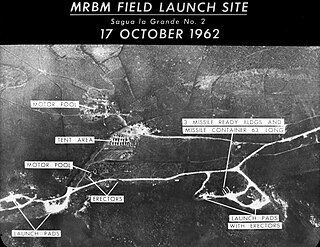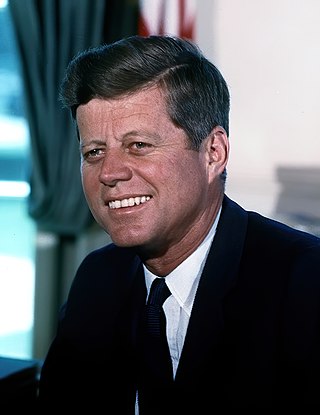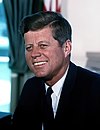Inaugural address: "Pay any price, bear any burden"
In his inaugural address on January 20, 1961, President Kennedy presented the American public with a blueprint upon which the future foreign policy initiatives of his administration would later follow and come to represent. In this Address, Kennedy warned "Let every nation know, whether it wishes us well or ill, that we shall pay any price, bear any burden, meet any hardship, support any friend, oppose any foe, in order to assure the survival and the success of liberty." 1 He also called upon the public to assist in "a struggle against the common enemies of man: tyranny, poverty, disease, and war itself." 1 It is in this address that one begins to see the Cold War. This speech laid out clearly, a vision of peace through strength and strength through international coalitions committed to the protection and expansion of the American ideals of Peace, Liberty and Justice for all.
Alliance for Progress
In his inaugural address, Kennedy talks of an alliance for progress with countries in Latin America. In his Alliance for Progress address for Latin American Diplomats and Members of Congress on March 13, 1961, he expanded on his promises from his inaugural speech. "I have called on all the people of the hemisphere to join in a new Alliance for Progress – alianza para el Progreso – a vast cooperative effort, unparalleled in magnitude and nobility of purpose, to satisfy the basic needs of the American people for homes, work and land, health and schools – techo, trabajo y tierra, salud y escuela." 3
In the address, Kennedy reaffirmed the United States' pledge of coming to the defense of any nation whose independence was endangered, promised to increase the food-for-peace emergency program and to provide economic aid to nations in need. He requested that Latin American countries promote social change within their borders and called upon all American nations to move towards increased economic integration. "To achieve this goal political freedom must accompany material progress. Our Alliance for Progress is an alliance of free governments – and it must work to eliminate tyranny from a hemisphere in which it has no rightful place. Therefore let us express our special friendship to the people of Cuba and the Dominican Republic – and the hope they will soon rejoin the society of free men, uniting with us in our common effort." 3
Debate over international role of United States
Many have questioned whether Kennedy's Inaugural Address, and the foreign policy stemming from the vision he expressed in it "describes an appropriate, rational, and prudent role for the United States in the world; whether it is an outline for an era of negotiation and accommodation and friendship; or whether it is a prescription for an untenable globalism, leading inevitably to increased areas of conflict, to a heightening of the arms race, and to American concern with and involvement, to one degree or another, in the affairs of almost every country in the world." 4
What remains clear is that Kennedy was deeply involved and committed to every aspect of the foreign policy under his administration. W. Averell Harriman served in and on behalf of Kennedy's Administration in several capacities, and noted, "President Kennedy was the first President, that I know of, who was really his own secretary of state. He dealt with every aspect of foreign policy, and he knew about everything that was going on." 5

Clarence Douglas Dillon was an American diplomat and politician, who served as U.S. Ambassador to France (1953–1957) and as the 57th Secretary of the Treasury (1961–1965). He was also a member of the Executive Committee of the National Security Council (ExComm) during the Cuban Missile Crisis. His conservative economic policies while Secretary of the Treasury were designed to protect the U.S. dollar.

The Alliance for Progress, initiated by U.S. President John F. Kennedy on March 13, 1961, aimed to establish economic cooperation between the U.S. and Latin America. Governor Luis Muñoz Marín of Puerto Rico was a close advisor on Latin American affairs to Kennedy, and one of his top administrators, Teodoro Moscoso, the architect of "Operation Bootstrap", was named the coordinator of the program by President Kennedy.

Brinkmanship or brinksmanship is the practice of trying to achieve an advantageous outcome by pushing dangerous events to the brink of active conflict. The maneuver of pushing a situation with the opponent to the brink succeeds by forcing the opponent to back down and make concessions rather than risk engaging in a conflict that would no longer be beneficial to either side. That might be achieved through diplomatic maneuvers, by creating the impression that one is willing to use extreme methods rather than concede. The tactic occurs in international politics, foreign policy, labor relations, contemporary military strategy, terrorism, and high-stakes litigation.

The Good Neighbor policy was the foreign policy of the administration of United States President Franklin D. Roosevelt towards Latin America. Although the policy was implemented by the Roosevelt administration, President Woodrow Wilson had previously used the term, but subsequently went on to justify U.S. involvement in the Mexican Revolution and occupation of Haiti. Senator Henry Clay had coined the term Good Neighbor in the previous century. President Herbert Hoover turned against interventionism and developed policies that Roosevelt perfected.
A United States presidential doctrine comprises the key goals, attitudes, or stances for United States foreign affairs outlined by a president. Most presidential doctrines are related to the Cold War. Though many U.S. presidents had themes related to their handling of foreign policy, the term doctrine generally applies to presidents such as James Monroe, Harry S. Truman, Richard Nixon, Jimmy Carter and Ronald Reagan, all of whom had doctrines which more completely characterized their foreign policy.

The Cold War (1953–1962) discusses the period within the Cold War from the end of the Korean War in 1953 to the Cuban Missile Crisis in 1962. Following the death of Joseph Stalin earlier in 1953, new leaders attempted to "de-Stalinize" the Soviet Union causing unrest in the Eastern Bloc and members of the Warsaw Pact. In spite of this there was a calming of international tensions, the evidence of which can be seen in the signing of the Austrian State Treaty reuniting Austria, and the Geneva Accords ending fighting in Indochina. However, this period of good happenings was only partial with an expensive arms race continuing during the period and a less alarming, but very expensive space race occurring between the two superpowers as well. The addition of African countries to the stage of cold war, such as the Democratic Republic of the Congo joining the Soviets, caused even more unrest in the West.

The Johnson Doctrine, enunciated by U.S. President Lyndon B. Johnson after the United States' intervention in the Dominican Republic in 1965, declared that domestic revolution in the Western Hemisphere would no longer be a local matter when the object is the establishment of a "Communist dictatorship". During Johnson's presidency, the United States again began interfering in the affairs of sovereign nations, particularly Latin America. The Johnson Doctrine is the formal declaration of the intention of the United States to intervene in such affairs. It is an extension of the Eisenhower and Kennedy Doctrines.

Thomas Clifton Mann was an American diplomat who specialized in Latin American affairs. He entered the U.S. Department of State in 1942 and quickly rose through the ranks to become an influential establishment figure. He worked to influence the internal affairs of numerous Latin American nations, typically focusing on economic and political influence rather than direct military intervention. After Lyndon B. Johnson became President in 1963, Mann received a double appointment and was recognized as the U.S. authority on Latin America. In March 1964, Mann outlined a policy of supporting regime change and promoting the economic interests of U.S. businesses. This policy, which moved away from the political centrism of Kennedy's Alliance for Progress, has been called the Mann Doctrine. Mann left the State Department in 1966 and became a spokesperson for the Automobile Manufacturer's Association.

John Fitzgerald Kennedy, often referred to as JFK or Jack, was an American politician who served as the 35th president of the United States from 1961 until his assassination in 1963. He was the youngest person elected president. Kennedy served at the height of the Cold War, and the majority of his foreign policy concerned relations with the Soviet Union and Cuba. A Democrat, Kennedy represented Massachusetts in both houses of the U.S. Congress prior to his presidency.
Cold War liberal is a term that was used in the United States during the Cold War, which began after the end of World War II. The term was used to describe liberal politicians and labor union leaders who supported democracy and equality. They supported the growth of labor unions, the civil rights movement, and the war on poverty and simultaneously opposing totalitarianism commonly seen under Communist rule at the time. Cold War liberals supported efforts of containment, such as diplomat George F. Kennan and U.S. president Harry S. Truman during the post-World War II era, towards Soviet Communism.

The Monroe Doctrine is a United States foreign policy position that opposes European colonialism in the Western Hemisphere. It holds that any intervention in the political affairs of the Americas by foreign powers is a potentially hostile act against the United States. The doctrine was central to American grand strategy in the 20th century.

Historically speaking, bilateral relations between the various countries of Latin America and the United States of America have been multifaceted and complex, at times defined by strong regional cooperation and at others filled with economic and political tension and rivalry. Although relations between the U.S. government and most of Latin America were limited prior to the late 1800s, for most of the past century, the United States has unofficially regarded parts of Latin America as within its sphere of influence, and for much of the Cold War (1947–1991), actively vied with the Soviet Union for influence in the Western Hemisphere.

John F. Kennedy's tenure as the 35th president of the United States began with his inauguration on January 20, 1961, and ended with his assassination on November 22, 1963. Kennedy, a Democrat from Massachusetts, took office following his narrow victory over Republican incumbent vice president Richard Nixon in the 1960 presidential election. He was succeeded by Vice President Lyndon B. Johnson.

John Moors Cabot was an American diplomat and U.S. Ambassador to five nations during the Truman, Eisenhower, and Kennedy administrations. He also served as Assistant Secretary of State for Inter-American Affairs. He warned repeatedly of the dangers of Soviet communism toward American interests in Latin America.

The inauguration of John F. Kennedy as the 35th president of the United States was held on Friday, January 20, 1961, at the East Portico of the United States Capitol in Washington, D.C. This was the 44th inauguration and marked the commencement of John F. Kennedy's and Lyndon B. Johnson's only term as president and vice president. Kennedy was assassinated 2 years, 306 days into this term, and Johnson succeeded to the presidency.

Robert Forbes Woodward was an American diplomat who focused on U.S. relations with Latin America.

Roy Richard Rubottom Jr. was an American diplomat, most notable for being Assistant Secretary of State for Inter-American Affairs from 1957 to 1960, a post in which he played a major role in engineering the United States' response to the Cuban Revolution.
The United States foreign policy during the presidency of John F. Kennedy from 1961 to 1963 included diplomatic and military initiatives in Western Europe, Southeast Asia, and Latin America, all conducted amid considerable Cold War tensions with the Soviet Union and its satellite states in Eastern Europe. Kennedy deployed a new generation of foreign policy experts, dubbed "the best and the brightest". In his inaugural address Kennedy encapsulated his Cold War stance: "Let us never negotiate out of fear. But let us never fear to negotiate".
This bibliography of John F. Kennedy is a list of published works about John F. Kennedy, the 35th president of the United States.
The United States foreign policy of the Dwight D. Eisenhower administration, from 1953 to 1961, focused on the Cold War with the Soviet Union and its satellites. The United States built up a stockpile of nuclear weapons and nuclear delivery systems to deter military threats and save money while cutting back on expensive Army combat units. A major uprising broke out in Hungary in 1956; the Eisenhower administration did not become directly involved, but condemned the military invasion by the Soviet Union. Eisenhower sought to reach a nuclear test ban treaty with the Soviet Union, but following the 1960 U-2 incident the Kremlin canceled a scheduled summit in Paris.


















